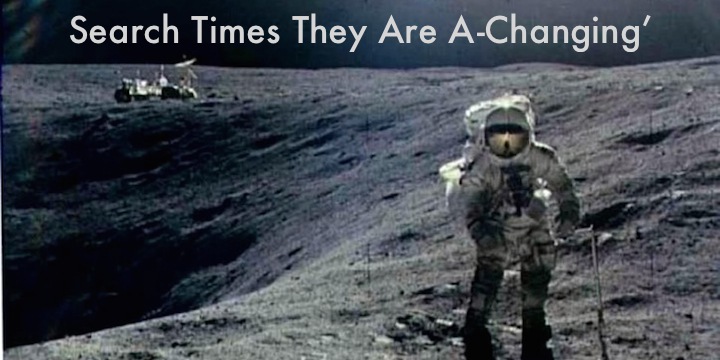The only unchanging truth about SEO is that it’s always changing.
I almost didn’t write that line, because it sounds so cliche.
I don’t want to dish up half-baked cliches. Instead, I intend to deliver some stop-and-think advice. We’ve heard cliches before. Ad nauseum. Search marketing in 2014 demands more than cliches. We to need to take a hard look at where search marketing is now, and maybe why our marketing gimmicks and tricks are having diminishing efficacy.
It’s time to consider what’s changed in SEO, and what we need to do about it. There are four major changes that I’ve observed during the first part of 2014. These changes — some subtle, and some overt — are signs that we need to adapt.
1. Content marketing is king.
It’s popular to say “Content is King.”
Sheesh. Talk about cliches.
While it is true, I want to make a case for content marketing over against the rather anemic “content” alone. Content marketing has a robust connotative meaning, and brings to mind more than just optimized titles and 800 words of content on a home page.
Content marketing trumps SEO in the conventional sense. Here’s why.
Conventional SEO doesn’t make you rank better. It just keeps you from doing worse.
I’m a huge fan of what I’m calling “conventional SEO.” I, in fact, am a conventional SEO. I geek out about robots.txt with the rest of them. I even wrote a nerdy uberlong magnum opus on recovering from a manual penalty. I dig conventional SEO.
But this kind of SEO — the robots.txt. the rel=canonicals, the 301 redirects, the optimized H1s, and the sitemap.xmls — that’s not winning you links and generating conversions. That’s just keeping you from having a shoddy site. See? You’re not going to win rank by just complying with standards. Sure, you’ve got to comply, but then what?
The real wins come through content — powerful, eye-popping, mind-blowing, epic, killer, clickable, actionable, shareable, even edible content. (Huh? Edible? Yes, edible.)
So, for all its geeky awesomeness, conventional SEO just won’t win the game. Content marketing will.
Reason number two why content marketing needs to reign as king….
SEO focuses on the onsite stuff. Content marketing gives you the real linkable power.
There are two main types of search optimization. First, there’s the stuff you do on your site to make it all nice in the eyes of the ever-watching Google. Then, there’s the epic stuff that you write that turns heads, prompts social shares, and gets linkbacks from DA 90+ sites.
That epic stuff? It’s called content marketing.
All the things you do on your website to make it not tick off Google — that’s great. Keep it up, please.
But get this: 95% of your SEO has to do with your link profile. You don’t get a killer link profile by just spiffing up your keywords and redirecting your 404s. You get a killer link profile by creating epic stuff that people want to link to.
So, to sum it up in a short memorable sentence that is not cliche: Content marketing is king.
You probably already knew that. Okay, here’s something you may not have thought of.
2. SEO and PR have merged.
Let me introduce this weird-sounding statement by telling a short story.
Once upon a time, early in my career as an SEO, one of my first clients hired us (the SEO agency), and a PR firm to help them be awesome.
That was a really bad idea.
They had this idea that the SEO and the PR firm would work together in sweet harmony. I’m not sure why they thought it would work that way. But it didn’t. Three weeks in, the client fired their SEO firm (us).
This illustrates a truth: The SEO agency (us) didn’t know what to do with the PR agency. And the PR agency didn’t know what to do with the SEO agency. It wasn’t working.
Fast forward several months, and let me tell you a new story.
Once upon a time, the SEO agency (that’s us, the good guys), got better at understanding PR. We had a different client who knew the potential power of SEO plus PR. They told us how we could help them get better PR.
And guess what. We did it! And it was awesome. We blended PR and SEO into a harmonious unity that caused rainbows to appear and unicorns to prance in lush green fields. We didn’t change our name to The Awesome PR Firm. We kept doing SEO as usual. But this time around, we saw that SEO and PR were locked in a powerful symbiotic relationship. I now realize that SEO and PR have merged. They’re BFFs. You can’t separate one from the other. Today’s “public relations” appears as the Google SERP and the social newsfeed. It’s SEO+PR.
You can’t expect to “do SEO” without thinking of PR. This is especially true for individuals — thought leaders, entrepreneurs, and niche experts. Their public stature has everything to do with the optimization of their web presence.
Today’s entrepreneurs and digital marketing professionals must understand how PR and SEO have converged to form a socially aware and digitally malleable public presence.
In a recent video, Matt Cutts told us where we’re at in search marketing, and highlighted this very point:
Here’s what he said:
“Over time, backlinks will become a little less important. If we could really be able to tell, you know, Danny Sullivan wrote this article…or Vanessa Fox wrote this article, something like that, that would help us understand — okay, this is something that we can tell, 1) it’s an expert, 2) it’s an expert in this particular field.”
In other words, traditional SEO is giving way to a the era of SEO plus PR. SEO is paving the way for PR, and vice versa.
A few organizations have grasped this merge, and have applied it. Their holistic approach seems unorthodox to the purists, but it’s totally comprehensible to those who know how SEO is changing. One such company, Mabbly.com, makes this statement: “We take traditional PR tactics and apply them to the digital era. We use a composite of content marketing, social media and SEO strategies.”
Since when does “SEO strategies” enter into a discussion of “PR tactics?” Well, ever since Google started ranking Google authorship profiles, and Wikipedia pages, and high-authority news articles, and brand-associated company scandal, and knowledge graphing hot topics into top-tier search results. And ever since people used search to find out about companies and individuals.
Yes, SEO strategies and PR tactics definitely go together.
That’s why SEO and PR belong in the same paragraph. That’s why SEO and PR need to be thought of, not as two separate disciplines, but as two sides of the complex polygon known as “digital marketing.”
In his skillful article, LinkedIn’s Jason Miller discussed the problematic clash between PR teams and content teams. One of his solutions was to have content “created by the content team, promoted by the social team, and launched by the PR team.” This is certainly one approach, but not the only one.
What is spot on, however, is Miller’s conclusion of the PR/Content synthesis: “This — [the PR/SEO synthesis] — is a beautiful thing, which will very likely make a much bigger impact than any one of these teams going it alone.”
PR and SEO are becoming one, and it’s time that SEO takes this into consideration.
3. The algorithm is wiser.
Google is out of the awkward adolescent years. Sort of. This September, they celebrate Sweet 16.
 Screenshot from Google.com, May 6, 2014.
Screenshot from Google.com, May 6, 2014.
Digital years are like dog years. You have to consider one as akin to like ten. Based on that math, Google is around 160 years old.
At this point, the algorithm is wise. If you 160 years old, you would probably be pretty wise, too.
We’ve watched the algo change dozens of times. Maybe you can remember the days when all it took was some good ol’ fashioned keyword stuffing and a few spammy directory links, and you were hitting the first position on Google. Bam! Easy!
Now, the algorithm is wiser and more complicated than our conjectures and prognostications. Recent algo rollouts have introduced a more intuitive search process. It’s simply not possible to game the system anymore. There is no such thing as “tricks” that really work over the long run.
In one example of the futuristic twist of search science trajectory, co-ocurence and co-citation are evidencing true value. The whole idea of “linkbuilding” may be going the way of the other SEO dinosaurs. (Like “keyword density.” Remember that? Ha.)
Now, the algorithm is wise. And we must heed its sage control over search.
4. Social is its own search.
YouTube is the second largest search engine, outstripping Bing, Ask, AOL, and Yahoo in sheer volume of searches. Twitter manages 2.1 billion queries every day. Facebook’s own search engine handles an estimated half billion on a daily basis.
This. This is the new SEO. And it’s completely social.
With this level of social emphasis, one shouldn’t wonder that personalities like Neil Patel are pointing to social as the new SEO.
The new power of social on the search landscape points up, first of all, the importance of being present on social media sites. Second, however, it highlights the importance of the quality of one’s personal presence. This goes back to the section about PR above. It matters how you look and what you say.
For entrepreneurs who aspire to recognition and authority within their field, it pays to form relationships and consult with other professionals who have answers.
Social SEO demands that we as individuals forge online identities — authentic yet cultivated — that cohere with our online goals and objectives. Whether you’re running a business, selling a widget, or simply serving the needs of others, your results in the social search roulette really do matter.
Conclusion
A new era of search marketing demands that we adapt, revise, regroup, and strategize our way forward. (I know — there are more changes than just these four, but I wanted to save some content for my next article, okay?)
If “innovative” and “agile” are more than just biz buzzwords to you, then this article has made perfect sense. Whether it’s an algo upset, or a shocking announcement, SEO changes mean you’ve got to pivot fast.
Hopefully, I’ve delivered more in this article than the pablum of boring cliches. Hopefully, there’s actionable advice that will inspire you to change. Because change is the business culture we have to navigate.
How are you adapting to the changes?




